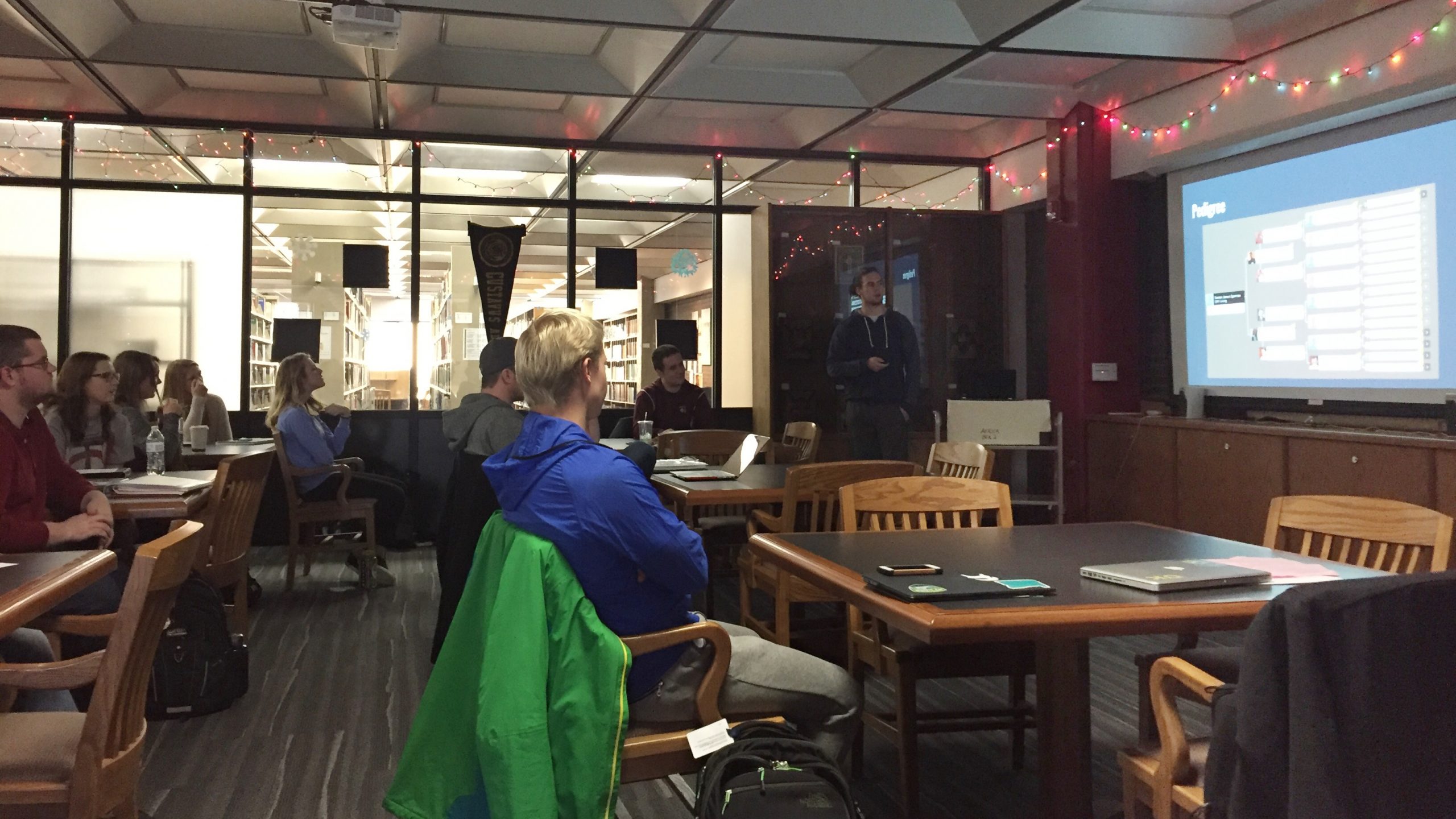One of the students discovered that his ancestors came to the New World on the Mayflower. Another learned that one of his forebears ended up in America after being accused of murder and smuggled out of Ireland.
During the four-week January Interim Experience class, 15 Gustavus Adolphus College students took an in-depth look at their backgrounds, confirming what they already knew, or – in some cases – debunking long-held family myths.
 The course, Genealogy: Research and Exploration, was taught by Jeff Jenson, associate professor and College and Lutheran Church archivist in the Folke Bernadotte Memorial Library. The intensive, month-long class allowed Jenson to teach research skills to students in an area that many of them are passionate about – their own family history.
The course, Genealogy: Research and Exploration, was taught by Jeff Jenson, associate professor and College and Lutheran Church archivist in the Folke Bernadotte Memorial Library. The intensive, month-long class allowed Jenson to teach research skills to students in an area that many of them are passionate about – their own family history.
“It’s really a methods class,” Jenson said. “We start at the beginning and build skills from the ground up, applying academic principles to genealogies that already exist to make sure that everything is accurate.”
“I had family research done for me before and I wanted to learn how to do it on my own,” junior Charles Maxfield said. “It was fun to try to find holes in the family tree that I already had by comparing it to the one I’m building myself.”
Students used sources including census data, marriage and divorce records, birth and death certificates, and city registries to not only learn about their relatives, but to record what they found.
“We’re following these families through time, documenting people’s lives,” Jenson explained. “We want to give credit to the resources we use and also create records that will make future genealogy research easier.”
The class was one of several January courses made possible by a grant from the Andrew W. Mellon Foundation that focuses on the development of the Digital Humanities. Besides a trip to the microfilm archive to review sources, all of the genealogy research and presentation of data during class periods was done using digital mediums.

“My aunt had done some research on family history, but it was rewarding to share some new tools with her,” sophomore psychology major Elissa Kinney said. Her fourth great grandfather helped build the town of Royalton, Minn. His son served as the community’s first physician.
Junior history major Chase Hanson discovered that one of his ancestors is counted among the founders of Tennessee. “I was fascinated with the whole thing,” he said. “I found it really cool to look at census documents and read through all the data to make connections.”
“We live in a generation where we’re used to having immediate access to everything, so it’s easy to be impatient,” Maxfield said. “You have to really pay attention to the data; it’s easy to find on the commercial genealogy sites, but you need to be able to verify that it’s accurate.”
“It was great to have someone to teach us to do the research properly,” Hanson agreed. “We had to make sure our information was up to the Genealogical Proof Standard, which is a guideline for getting sources right and making sure that things are laid out properly.”
 The course included students from majors ranging from English and history to financial economics and athletic training.
The course included students from majors ranging from English and history to financial economics and athletic training.
“These students came together and shared a lot of personal information with one another,” Jenson said. “That’s what is so great about the January Interim – there’s a lot of passion for the subject in a very short and intense amount of time.”
Maxfield, who came to Gustavus after serving in the military, also used the class to introduce his eight-year-old daughters to their family history. “When I brought them to the Blue Earth County Historical Society I thought it would be a constant struggle to keep them interested, but as soon as I showed them our name in the card catalogue, they were instantly engaged,” he recalled. He bought a family pass to the museum the same day.
And what was the biggest takeaway for the diverse group of Gustavus students?
“That past does not define us, that’s the main thing,” Jenson said. “The students own their future. This is their family history, but it’s not who they are.”
 The Andrew W. Mellon Foundation was founded in 1969 by Ailsa Mellon Bruce and Paul Mellon. The Foundation endeavors to strengthen, promote, and where necessary, defend the contributions of the humanities and the arts to human flourishing and to the well-being of diverse and democratic societies. To this end, it supports exemplary institutions of higher education and culture as they renew and provide access to an invaluable heritage of ambitious, path-breaking work.
The Andrew W. Mellon Foundation was founded in 1969 by Ailsa Mellon Bruce and Paul Mellon. The Foundation endeavors to strengthen, promote, and where necessary, defend the contributions of the humanities and the arts to human flourishing and to the well-being of diverse and democratic societies. To this end, it supports exemplary institutions of higher education and culture as they renew and provide access to an invaluable heritage of ambitious, path-breaking work.

Leave a Reply